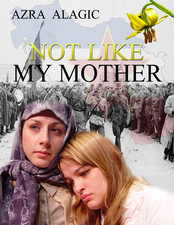 Azra Alagic is a Brisbane-based writer and former journalist. Her short stories have been published in Borderlands, Miel Magazine and UQ Vanguard. She co-edited Passion, Prose and Poetry, and has received two RADF grants for her writing,and was nominated for an Aurealis Award. Not Like My Mother is her first book and is now available on Ibooks or Amazon
Azra Alagic is a Brisbane-based writer and former journalist. Her short stories have been published in Borderlands, Miel Magazine and UQ Vanguard. She co-edited Passion, Prose and Poetry, and has received two RADF grants for her writing,and was nominated for an Aurealis Award. Not Like My Mother is her first book and is now available on Ibooks or Amazon
1. NLMM is described as creative non-fiction. What were your primary sources for the books?
The book is based on stories told to me by my parents, grandparents and extended family. I was intrigued by the complexity of the cultures that made up the former Yugoslavia and the history that influenced the breakout of the Balkan wars. I also researched stories from victims who were brave enough to come forward and tell their stories, and read transcripts from the Hague’s War Crimes Tribunal. For me, writing Not Like My Mother was very much about giving a voice to the victims and to all sides of the civil dispute.
2. What affect did your families stories about the troubles in the Balkans affect your life growing up?
Though I was born in Australia, I have always had a strong affinity with my parents’ homeland which back in the 80s was Yugoslavia but after the war broke out I suddenly couldn’t call myself Yugoslav anymore because it was ‘politically’ incorrect. Up until then I was unaware of the underlying divisions that had been simmering in Yugoslavia. When the war broke it triggered all these stories from family, they spilled forth as the emotions of watching their homeland be torn apart shook their identity and cracked open the tenuous peace that existed. The war reached out across the world to us here in Australia and peeled away memories that had been tucked away for years. I became obsessed with trying to understand my culture and the hatred and violence that lived there. I don’t think I’ve succeeded yet – it’s a journey that is still evolving.
war broke out I suddenly couldn’t call myself Yugoslav anymore because it was ‘politically’ incorrect. Up until then I was unaware of the underlying divisions that had been simmering in Yugoslavia. When the war broke it triggered all these stories from family, they spilled forth as the emotions of watching their homeland be torn apart shook their identity and cracked open the tenuous peace that existed. The war reached out across the world to us here in Australia and peeled away memories that had been tucked away for years. I became obsessed with trying to understand my culture and the hatred and violence that lived there. I don’t think I’ve succeeded yet – it’s a journey that is still evolving.
3. Can you tell us a little about what to expect from the sequel? When is it due for release?
The Comfort Women picks up on Majra’s story and the bravery of the Bosniak women forced into rape camps. Yasna doesn’t know whether she will find Majra alive or dead but she knows she has to try. It’s a story about strong women, hope survival, song and finding justice in places one might not expect. I’m hoping to have it released late 2013.
4. What other creative projects are you working on?
I always seem to have a dozen projects on the go and sometimes struggle to stay focused on one particular story because they all speak to me so strongly, but my interest in Australia’s ‘illegal refugees’ has me writing a novel about the plight of an Afghani refugee, a people smuggler and an Australian soldier. The story is very much in it’s infancy but I’m really liking the way it’s coming together. I’m also working on a chic lit called The Other Woman, I’m onto the second draft and it explores lure of infidelity, the spice of a forbidden relationship and the difficulty in being the ‘other’ woman.
5. What is your best advice for new writers?
Write what you’re passionate about, it will come through in your writing and capture your reader. Never give up on your dream.


































